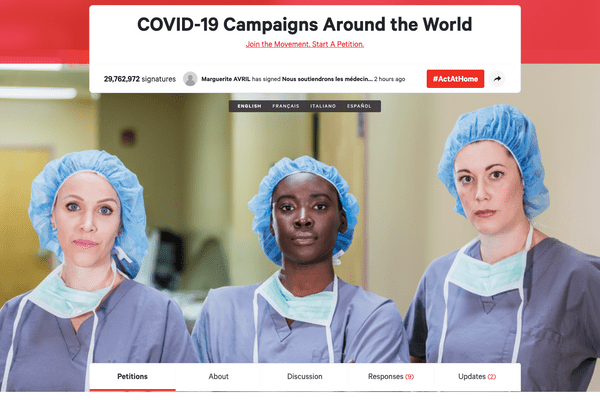
Major giving & legacies most likely to grow for Dutch & UK charities in next three years
September 9, 2020
GivingTuesday launches Starling Collective to support grassroots leaders
September 9, 2020The pandemic has sparked an increase in digital activism worldwide, with Italy, Spain, the UK, France, and Germany among the countries globally to have seen the biggest rises in civic engagement on Change.org since January.
Change.org’s Global Civic Engagement Index, built by the Change.org Foundation, is based on data for the top 25 countries with the highest engagement on Change.org from January 2020 to July 2020, comparing this to the same period in 2019.
The global report shows that since January, coinciding with the outbreak of Covid-19, there has been a steep increase in people using online tools on Change.org to voice concerns, influence policy and persuade decision makers to make changes on political, societal and cultural issues.
In 22 of the 25 top countries, there was a substantial increase in support of petitions compared to 2019, with a global average increase of 81% in signatures (people joining or supporting a petition). In 23 countries, the number of petitions created in the past seven months increased significantly. Overall, comparing data from 2019, petitions have increased by 80%. The number of users on Change.org has also increased across all countries, by nearly 33%.
More than 110 million people worldwide have supported Covid-19 related campaigns, although this only represents part of this growth.
Five European countries, UK, Italy, Spain, France and Germany, are in the top 25. They saw:
– UK (6/25) –Petition growth: 118.94%. Signature growth: 115.63%. User base growth: 19.79%
– Italy (13/25) – Petition growth: 125.72%, Signature growth: 9.44%. User base growth: 13.81%
– Spain (14/25) – Petition growth: 68.51%. Signature growth: 4.40%. User base growth: 6.01%
– France (16/25) – Petition growth: 64.02%. Signature growth: 22.36%. User base growth 13.23%
– Germany (21/25) – Petition growth: 45.40%. Signature growth: 23.56%. User base growth: 27.27%
The report also highlights the top five Change.org petitions that influenced governments to change policy over the last seven months, three of which were in Europe.
In second place, Germany had conflicting views on how the government should handle lockdown and what policy changes needed to be made. These views were reflected as petitions on Change.org. One campaign influenced the German government to make a change: a petition by Stefan Draschan, which urged the federal government to impose a curfew.
In third place, Spain, where one of the most restrictive lockdowns took place, petitions were set up calling on the Government to provide clarity on the closure of hairdressers and beauty salons. More than 90,000 people signed a petition in a matter of hours, asking the government for clarity. A day later the Government had to rectify and explain that these centres would remain closed, except for home services.
In fourth place, more than 100,000 people in France signed the COVID-19 testing for all petition. The Minister of Health, Olivier Véran, considered that the platform was the best way to address citizens’ questions on the matter. His response was directly sent to hundreds of thousands of people. Following this, from mid-March to mid-May 2020, six French government ministers responded to petitions related to the COVID-19 health crisis. The Ministers of Housing, Health, Sports, Education, Culture and Economy have all decided to open a dialogue with users.
Preethi Herman, global executive director at Change.org Foundation said:
“This report highlights not just the trends and index but many of the social, cultural and political challenges faced by millions around the world. We are hearing from people around the world about not just their problems, but the solutions they deserve, and witnessing Governments and decision makers recognising the need to respond to them online. The last few months have revealed that this world has entered a new era of civic engagement and digital activism and there are a number of non-traditional players who are leading the way to create a new wave of positive, people driven change.”




